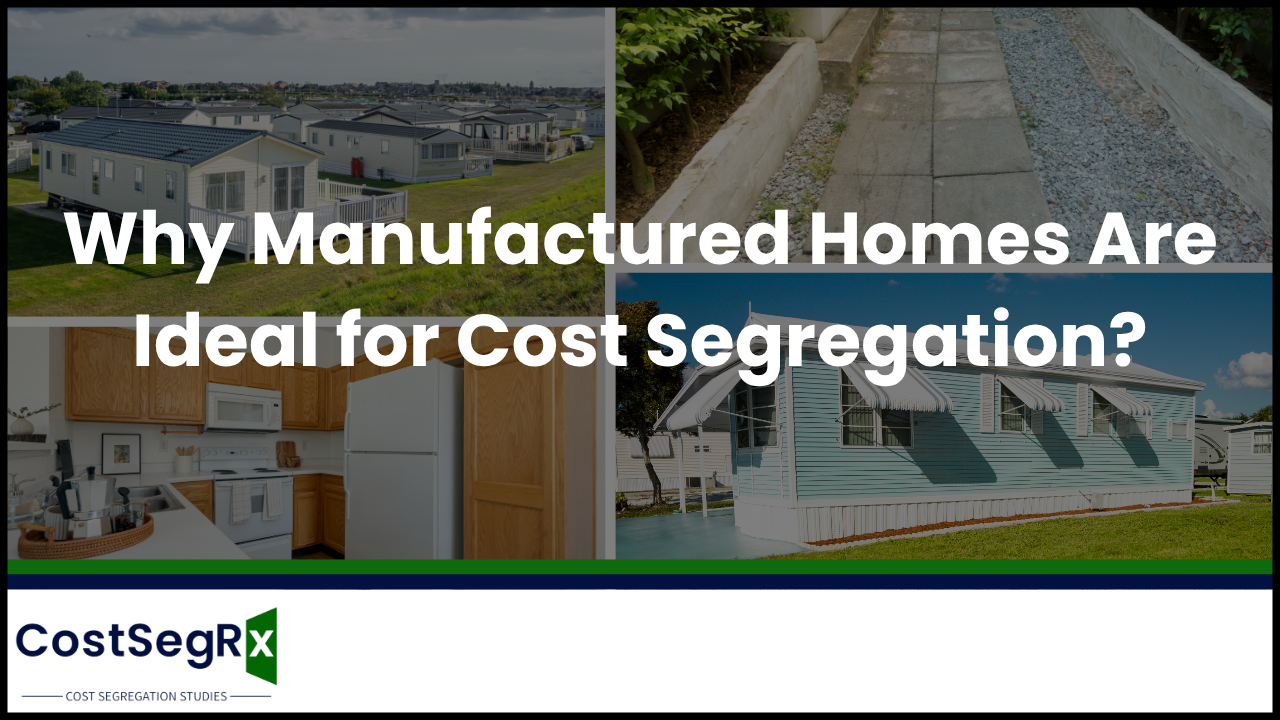
Why Manufactured Homes Are Ideal for Cost Segregation?
May 30, 2025Manufactured homes often referred to as mobile homes are an increasingly popular investment class in real estate. Whether owned individually or as part of a larger mobile home park, these properties offer unique opportunities for accelerated depreciation through cost segregation. We’ll explore how cost segregation applies to manufactured homes and how investors can unlock substantial tax savings by leveraging this strategy.
Key Takeaways
- Manufactured homes contain a high percentage of short-life assets, making them excellent candidates for cost segregation and accelerated depreciation.
- Bonus depreciation allows investors to immediately deduct a significant portion of 5 and 15-year assets and improving cash flow.
- Cost segregation is applicable to both park-owned and individually owned manufactured homes, offering flexible tax strategies for investors of all sizes.
Table of Content
- Key Takeaways
- What Are Manufactured Homes?
- Depreciation Basics: Manufactured Homes vs. Traditional Real Estate
- Why Cost Segregation Works for Manufactured Homes
- Bonus Depreciation Opportunity
- Who Should Consider Cost Segregation for Manufactured Homes?
- Conclusion: Don’t Leave Tax Savings on the Table
What Are Manufactured Homes?
Manufactured homes are prefabricated structures built in a factory and transported to a permanent site. While commonly associated with affordability, today’s manufactured homes come in a variety of styles, quality levels, and configurations from single-wide units to luxury double- and triple-wide homes.
Real estate investors are increasingly recognizing the value of manufactured homes, especially in markets with housing shortages or affordability concerns. Whether used for individual rentals, park-owned units, or tenant-owned models on leased land, these properties can generate stable and predictable cash flow.
Depreciation Basics: Manufactured Homes vs. Traditional Real Estate
Traditionally, manufactured homes depreciate over 27.5 years (residential rental property) or 39 years (non-residential property) under the Modified Accelerated Cost Recovery System (MACRS). However, many of the components within a manufactured home—such as appliances, flooring and land improvements can be depreciated over much shorter periods (5, 7, or 15 years).
Why Cost Segregation Works for Manufactured Homes
Manufactured homes are excellent candidates for cost segregation due to their:
- Prefabricated design: Components are modular and clearly delineated making segregation more straightforward.
- Heavy use of personal property: Items like cabinetry, carpeting, plumbing, and electrical systems can often be classified as 5 or 7-year property.
- Land improvements: Site paving, utility hookups, fencing and landscaping can be reclassified into 15-year property.
In many cases, up to 11-20% of the cost of a manufactured home can be reclassified into shorter-life assets, offering substantial tax deferral and improved return on investment.
Bonus Depreciation Opportunity
As of 2025, bonus depreciation is still available at 40%, allowing investors to immediately expense a large portion of qualifying short-life assets identified through cost segregation. This provision applies to both new and used property making manufactured home purchases particularly lucrative from a tax standpoint.
Who Should Consider Cost Segregation for Manufactured Homes?
This strategy is ideal for:
- Mobile home park owners (with park-owned units)
- Investors purchasing individual manufactured homes for rental income
- Developers placing multiple units on land for leasing or resale
- Real estate professionals seeking to offset income with large deductions
Conclusion
Manufactured homes are not just affordable. They’re also highly tax-efficient when structured correctly. Cost segregation allows investors to unlock hidden value within these properties by front-loading depreciation and maximizing cash flow.
If you’ve recently acquired a manufactured home and considering an investment in this space, it’s worth having a cost segregation study performed by a qualified specialist.
Do you have a question about Cost Segregation?
Let us know how we can help
We hate SPAM. We will never sell your information, for any reason.


